|
|
|
Sort Order |
|
|
|
Items / Page
|
|
|
|
|
|
|
| Srl | Item |
| 1 |
ID:
144691
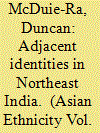

|
|
|
|
|
| Summary/Abstract |
In this article I explore the emergence, or re-emergence, of what I refer to as adjacent identities in response to changing circumstances for many Northeast communities in the last decade. In this paper I argue that it is important to consider seriously the ways in which communities in the region respond to the material and ideational changes to their lives in the present conjuncture by exploring adjacent ways of constructing identity in the face of, but not necessarily directly caused by, changing social, political, and economic circumstances. Massive investment in connectivity, which has transformed the Northeast from a frontier into a corridor, rapid urbanisation in the region, and an increase in migration out of the region have intensified the encounters between communities from the region and so-called ‘mainstream’ India and have brought different ethnic communities into closer daily proximity in the plural urban spaces of the region. The purpose of this article is to recognise adjacent ways of constructing identity in the face of, but not necessarily directly caused by, changing social, political, and economic circumstances. I provide two examples, shared Northeast identity in response to racism and broader ethnic inclusion based on shared cosmopolitanism. The former is a mass category in which virtually anyone from the Northeast can slip into, whereas the second relates specifically to speakers of a common language divided by international and internal borders.
|
|
|
|
|
|
|
|
|
|
|
|
|
|
|
|
| 2 |
ID:
079632
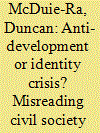

|
|
|
|
|
| Publication |
2007.
|
| Summary/Abstract |
This paper discusses the complex relationship between civil society and development in Asia by examining the role of ethnic identity in anti-development movements. Local and transnational movements by civil society actors against dams, mines, and deforestation have gained increased attention in academia and activist circles in the last decade, often used as evidence in arguments that development as part of neo-liberalism and/or state-led socialism is faltering. Furthermore, tribal, indigenous, and minority communities are often portrayed as having a closer relationship to the environment, which is seen as instrumental in their opposition to development projects. While agreeing with these arguments to some extent, this paper examines the local context of anti-development movements using research from fieldwork in the Indian state of Meghalaya and argues that struggles over development projects are also struggles over ethnic identity. In Meghalaya, civil society actors from the Khasi ethnic group have opposed several large development projects on the +grounds that these projects will attract labourers from Bangladesh and other parts of India, threatening the survival of the Khasi ethnic group. Damage to the environment, livelihoods, and loss of land are rarely a concern. The failure to recognize the influence of ethnic identity politics in critiques of development raises the risk of misreading both the extent of anti-development sentiments in civil society and the potential for development projects to be reframed by proponents into an acceptable ethnic guise. Furthermore, the actors contesting development through identity politics are overwhelmingly from urban areas, leaving rural people with limited access to civil society. This paper attempts to add a critical perspective to current literature on development and civil society using empirical examples from one of the least researched regions in Asia
|
|
|
|
|
|
|
|
|
|
|
|
|
|
|
|
| 3 |
ID:
075239
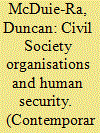

|
|
|
|
|
| Publication |
2006.
|
| Summary/Abstract |
This paper examines the limitations on civil society organisations (CSOs) in India's Northeast, specifically the state of Meghalaya, and suggests some strategies they must pursue to overcome them. The majority of literature concerning the Northeast tends to focus on national security, insurgency and violence, with a limited analysis of the role of CSOs and the human security of people living in these circumstances. CSOs in the Northeast face restrictions from above by the central government and the military, and from below by insurgent organisations and ethno-nationalist movements; in other words, by civil society itself. While the struggle for autonomy and rights in the Northeast looks set to continue, the effectiveness of CSOs is being further jeopardised as they are caught between these more powerful actors. The functioning of CSOs is being curtailed, and the lives and needs of people living between these poles are being neglected. Using Meghalaya as an example, this paper discusses the consequences for human security and the limitations faced by CSOs operating in the region. The paper argues that, in order to more effectively empower the people in the region, CSOs need to transcend co-optation from above and below, and focus on local human security issues rather than nationalist or ethno-nationalist agendas.
|
|
|
|
|
|
|
|
|
|
|
|
|
|
|
|
| 4 |
ID:
091500
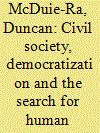

|
|
|
|
|
| Publication |
NewYork, Nova Science Publishers, 2009.
|
| Description |
viii, 219p.
|
| Standard Number |
9781606928325
|
|
|
|
|
|
|
|
|
|
|
|
Copies: C:1/I:0,R:0,Q:0
Circulation
| Accession# | Call# | Current Location | Status | Policy | Location |
| 054530 | 300.954164/MCD 054530 | Main | On Shelf | General | |
|
|
|
|
| 5 |
ID:
112742
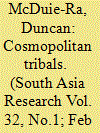

|
|
|
|
|
| Publication |
2012.
|
| Summary/Abstract |
Based on fieldwork, this article examines various aspects of tribal migration from the Northeast frontier of India to Delhi, a phenomenon which increased rapidly in the last half decade or so. This offers insights into four important interlinked processes. First, such migration indicates significant changes taking place in the Northeast itself. While many migrants leave the region to escape conflict, many more simply seek to find work, pursue education and fulfil changing aspirations. Second, tribal migration to Delhi reveals the ways in which the city itself has been changing. While tribal migrants search out employment opportunities in neoliberal capitalist spaces, employers in such spaces have specific reasons to desire tribal labour, particularly in shopping malls and call centres. Third, tribal migrants encounter racism and discrimination in Delhi and their experiences reveal how racial issues function and are debated today within India. Fourth, tribal migrants themselves embody the dramatic discord between the ways tribals see themselves and the ways they are perceived in India.
|
|
|
|
|
|
|
|
|
|
|
|
|
|
|
|
| 6 |
ID:
101853
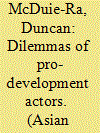

|
|
|
|
|
| Publication |
2011.
|
| Summary/Abstract |
Studies of ethnic minority peoples in Asia have long focussed on the relations between ethnic minority communities and the modern state and on the role of development in shaping these relations. This paper is concerned with how ethnic minorities respond to the state-led development. While there are numerous studies focussing on the collective agency of ethnic minorities opposing development projects, few studies consider the agency of pro-development actors. Pro-development actors are usually dismissed as co-opted, manipulated, inauthentic, or elite-driven, yet they can offer crucial insights into understanding state-ethnic minority relations and particularly intra-ethnic minority relations. This paper concentrates on pro-dam actors from the Lepcha minority in the Indian state of Sikkim to make four interlinked arguments. First, examining pro-development actors breaks the homogenous view of state-ethnic minority relations and shifts the focus to intra-ethnic relationships. Second, collective agency of ethnic minorities is not fixed in a particular relationship with the state nor does it have a particular position on development. Third, the long-term experience of development is vital in understanding how ethnic minorities manoeuvre and alter their position on contentious projects. Lastly, analysis of pro-development actors creates major dilemmas for researchers which are not easily overcome.
|
|
|
|
|
|
|
|
|
|
|
|
|
|
|
|
| 7 |
ID:
157089


|
|
|
|
|
| Summary/Abstract |
In Nagaland, state attempts to control coal mining are framed as efforts to stop practices labelled ‘unscientific’ by the government. In this article we explore the ways in which communities create their own mining infrastructure built on networks of relations—materialised in English-language documents—and everyday technology—demonstrated in the prevalence of old trucks and improvised machinery. These objects enable livelihoods and supplementary incomes in this region. At the same time, they are also ways of challenging state attempts to control natural resources and for tribal communities to make claims on territory. We focus on coal mining infrastructure, technology and territorial claims in a frontier described variously as remote, inaccessible and underdeveloped, and explore the ways in which practices considered ‘unscientific’ endure and undergird an alternative system of community natural resource management and exploitation.
|
|
|
|
|
|
|
|
|
|
|
|
|
|
|
|
| 8 |
ID:
131616
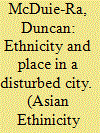

|
|
|
|
|
| Publication |
2014.
|
| Summary/Abstract |
This article explores the relationships between ethnicity, place and belonging in the city of Imphal, capital of the state of Manipur in India's Northeast border region. Manipur has experienced decades of conflict from ethno-nationalist separatism, inter-ethnic territorial disputes and counter-insurgency operations. These ethnic conflicts play out on the urban landscape of Imphal. Control of the city from above is diffused among the civilian government and the armed forces. Non-state actors such as insurgent groups and ethnic organizations exert their own control from below. On such unstable ground, struggles by residents seeking to create place and a sense of belonging affirm ethnic boundaries. These boundaries are not static and the lines between inclusion and exclusion are continually redrawn along existing and emerging fault-lines among the population. Yet these boundaries are also transcended in unusual ways that may seem trivial but in Imphal are essential to realizing alternative ways of belonging.
|
|
|
|
|
|
|
|
|
|
|
|
|
|
|
|
| 9 |
ID:
090564
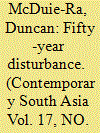

|
|
|
| 10 |
ID:
139470
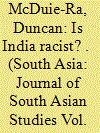

|
|
|
|
|
| Summary/Abstract |
After the 2012 Olympics, Bronze Medal-winning boxer Mary Kom achieved national celebrity status in India. As a member of the Kom tribe, a Tibeto-Burman community from the Northeast region, she has come to represent a region long considered, and self-identifying, as outside the boundaries of the Indian nation. The same week that Mary Kom returned from London, thirty thousand Northeast migrants fled Indian cities fearing racially-motivated attacks. The so-called ‘exodus’ provoked rare conversations on racism within India. During this crisis, the figure of Mary Kom was invoked continually to challenge the existence of racism in India and posit paths to better integration in India's cities. These conversations paid little attention to the brutality perpetrated by the Indian state and military in the Northeast itself and the voices that publicised this brutality. Thus, while Mary Kom has come to represent a Northeast that Indians can embrace, figures such as dissident Irom Sharmila represent a Northeast that Indians wish to forget.
|
|
|
|
|
|
|
|
|
|
|
|
|
|
|
|
| 11 |
ID:
183824
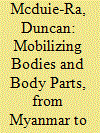

|
|
|
|
|
| Summary/Abstract |
This article focuses on cross-border medical connections between Myanmar and Manipur, India. Non-state actors have been instrumental in creating the networks to bring bodies and body parts back and forth, first bypassing, then enmeshing, state actors. I focus on the movement of patients and medical samples across the border—from western Myanmar to Imphal city and back again—and the health infrastructure that enables it. Analysing these connections makes several contributions to the study of border governance. First, movement from Myanmar to Manipur is primarily for treatment or diagnosis, and these connections project particular ways of thinking about each place—western Myanmar as poor and remote, Manipur as advanced and networked. Second, both Manipur and western Myanmar can be considered in ‘transition’—as territories being recalibrated by political dynamics emanating elsewhere yet becoming connected through shared needs. Third, patients and samples move through territories controlled by paramilitary forces, underground groups, and different tribal councils. Routes are sometimes blocked or passage treacherous, testing the limits of conventional notions of bilateral border governance. Finally, cross-border medical connections between Manipur and Myanmar draw attention to the risky cross-border medical mobility of the poor. Rather than seeking to minimize cost, patients utilize Manipur's health infrastructure out of necessity, providing insights into the contours of cross-border medical care in times of transition.
|
|
|
|
|
|
|
|
|
|
|
|
|
|
|
|
| 12 |
ID:
168568


|
|
|
|
|
| Summary/Abstract |
India's Smart Cities Mission (SCM) launched in 2015 has awarded 100 smart cities nation-wide, proffering funds, compulsory corporate partnerships, and new configurations of urban governance. Perhaps most striking are the ten smart city bids from Northeast India, a region shaped unevenly by separatism, military occupation, and heavy economic dependency. Smart cities in the Northeast have been awarded with key exceptions to SCM rules. We take this to be a largely unprecedented experiment in digital urbanism in what Dunn and Cons (2014. “Aleatory Sovereignty and the Rule of Sensitive Spaces.” Antipode 46 (1): 92–109) label ‘sensitive space’. Through a critical reading of the 10 smart city bids from the Northeast we make three arguments. First, despite the techno-utopian rhetoric, the primary aim of the SCM is integrating frontier space into national territory. Second, the extension of the SCM to the frontier accelerates the recalibration of the frontier into a market for corporate capital under the necessary stewardship of the Indian state, though the role for customary authorities in these arrangements is unclear. Third, with few other avenues for revenue generation and in response to perceptions of neglect, local authorities have used SCM bids to request conventional infrastructure rather than digitally networked projects.
|
|
|
|
|
|
|
|
|
|
|
|
|
|
|
|
| 13 |
ID:
149926
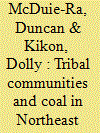

|
|
|
|
|
| Summary/Abstract |
Bans on coal mining have been implemented in two tribal majority states in India's north-east frontier; Nagaland and Meghalaya. In Nagaland the state government imposed the ban in an attempt to capture control of coal extraction and trade, while in Meghalaya India's National Green Commission imposed the ban over concern for the environment and labour conditions. In both cases local communities have opposed the bans, and in some areas resumed mining under the authority of tribal councils and powerful civil society actors. In this paper we explore the politics of coal extraction that resulted in these bans and the response of communities and authorities. In doing so we made three main arguments that contribute to understanding of coal and communities in frontier regions where state control is partial and the legacy of armed conflict is powerful. First, in both locations the majority of the coal mining activity has been initiated and managed by members of tribal communities rather than profit-driven outsiders. Second, in contrast to other contexts in India (notably Orissa and Jharkhand) where large state or private enterprises seek to modify the law to enable coal extraction, in Nagaland and Meghalaya it has been communities that resent and challenge state and national laws being applied to their lands. Third, the right to extract coal is connected to the right of tribal communities to determine what happens on their lands.
|
|
|
|
|
|
|
|
|
|
|
|
|
|
|
|
| 14 |
ID:
109879
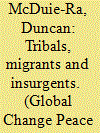

|
|
|
|
|
| Publication |
2012.
|
| Summary/Abstract |
The fencing of the India-Bangladesh border suggests finality in the territorial partitioning of South Asia. This article examines the converging and competing narratives surrounding the fence at the national level in India and in the borderland itself, focussing on the federal state of Meghalaya. From this comparison two main arguments are made. First, at the national level, narratives around migration, national security, counterinsurgency and trade underpin a powerful logic that is difficult to contest. By contrast, in Meghalaya the narratives are less cohesive and the logic of the fence is far more contingent on local politics. Second, not only is there a difference between the ways the fence is viewed at the national level and in the borderland, but there is differentiation within the borderland itself. These narratives provide insights into the different ways borders, citizenship and insecurity are viewed and politicised in contemporary Asia and beyond.
|
|
|
|
|
|
|
|
|
|
|
|
|
|
|
|
| 15 |
ID:
090571
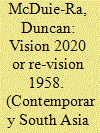

|
|
|
|
|
| Publication |
2009.
|
| Summary/Abstract |
Insurgency in Northeast India has long been explained as an outcome of poverty and isolation that in turn produces further poverty and militancy. In order to break this cycle and achieve 'peace and prosperity', the Indian Government released North Eastern Region Vision 2020 in July 2008 - a comprehensive policy agenda to achieve 'peace and prosperity' in the Northeast. This is to be realised through deeper economic and political engagement with neighbouring countries and a 'paradigm shift in development strategy' that will be simultaneously more participatory and more infrastructure intensive. This paper argues that in practice the political manifestations of increased regional engagement are contradictory. Each measure designed to break the region's isolation is countered by measures to maintain control of borders, trade, and the movement of people. At the heart of this new development vision is a re-visioning of counter-insurgency underpinned by the Armed Forces Special Powers Act (1958). Far from signalling a new era in the region, the measures contained in this new development vision appear more likely to exacerbate the grievances of people in the region and reinforce the ways the region has been governed through five decades of counter-insurgency.
|
|
|
|
|
|
|
|
|
|
|
|
|
|
|
|
|
|
|
|
|